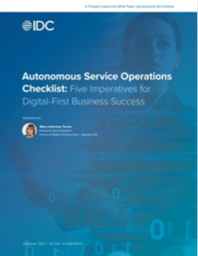Autonomous Service Operations Checklist: Five Imperatives for Digital-First Business Success
Digital business depends on scalable and resilient digital infrastructure, modern data-intensive applications, and autonomous service operations. Self-driving and self-healing service operations represent a new generation of highly automated and business-driven change and incident management, asset optimization, and support services. They are driven by business policies and architected for consistency across cloud, datacenter, and edge platforms. Unlike traditional asset tracking and change control procedures, autonomous service operations are built for digital business environments that scale and adapt quickly as DevOps teams continuously introduce new innovations, employees work from anywhere, and customers demand personalized online experiences.
Read More
By submitting this form you agree to ServiceNow contacting you with marketing-related emails or by telephone. You may unsubscribe at any time. ServiceNow web sites and communications are subject to their Privacy Notice.
By requesting this resource you agree to our terms of use. All data is protected by our Privacy Notice. If you have any further questions please email dataprotection@techpublishhub.com
Related Categories: Analytics, Applications, Cloud, Cloud Software, Compliance, Connectivity, Data Center, Data Centers, Data management, Data Recovery, DevOps, Digital Infrastructure, Enterprise Applications, ERP, IOT, IT Management, ITSM, Machine Learning, Network, SAN, Service Management, ServiceNow, Software, Telecommunications


More resources from ServiceNow

Aberdeen Customer Operations
This report by Aberdeen reveals the role and impact of customer operations on service and back-office activities—highlighting how leading firms b...

Gorilla Guide: Citizen development with Servi...
By creating a partnership between citizen developers and your IT team, end users at your organization can build high-quality solutions quickly and ...

Future-Proof your Organization’s ERP System...
Organizations need a clean core for transformation and future-proofing their ERP investment. No matter what the business drivers are impacting stra...